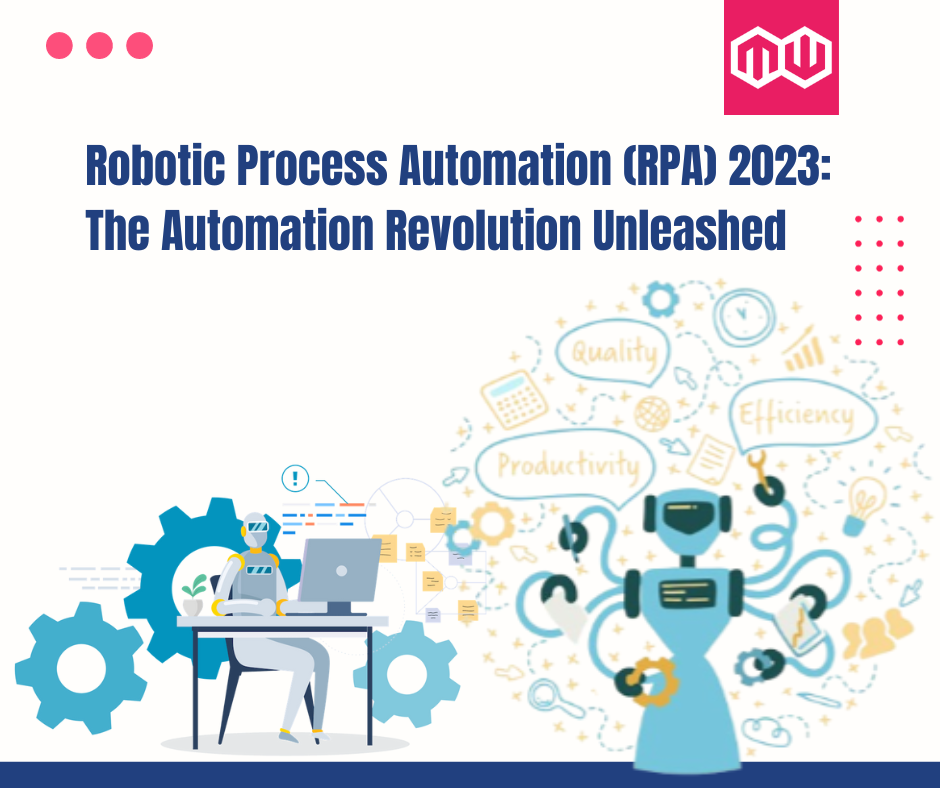Robotic Process Automation (RPA) 2023: The Automation Revolution Unleashed
In the fast-paced landscape of technology, Robotic Process Automation (RPA) has emerged as a transformative force, reshaping industries and revolutionizing the way businesses operate in 2023. RPA, the sophisticated technology that utilizes robots or “bots” to automate repetitive tasks, has far-reaching implications, touching various aspects of our lives and industries.

Here’s a comprehensive look at how RPA is driving change across the globe:
1. Enhanced Efficiency and Productivity
RPA technologies have streamlined workflows across industries. Mundane, rule-based tasks that once consumed hours of human labor are now executed with unprecedented speed and accuracy. This efficiency not only saves time but also significantly reduces operational costs, allowing businesses to focus on innovation and growth.
2. Empowering the Workforce
Contrary to the fear that automation might replace human jobs, RPA has empowered the workforce. By handling repetitive tasks, employees are freed to concentrate on strategic, creative, and customer-focused initiatives. This shift has elevated job satisfaction and overall productivity, fostering a more dynamic work environment.
3. Revolutionizing Customer Service
Customer service has undergone a paradigm shift with the integration of RPA. Bots equipped with artificial intelligence can provide instant responses to customer queries, resolve issues, and even anticipate needs. This level of responsiveness has not only enhanced customer satisfaction but has also created a more personalized and efficient customer experience.
4. Precision in Decision Making
RPA’s ability to process vast amounts of data in real-time has revolutionized data analysis and decision-making processes. Businesses can now make informed decisions based on accurate, up-to-date information, leading to more strategic and impactful choices.
5. Strengthening Cybersecurity
RPA plays a pivotal role in bolstering cybersecurity efforts. Advanced RPA systems can detect and respond to potential security breaches in real-time, mitigating risks and ensuring data integrity. This proactive approach is instrumental in safeguarding sensitive information in an increasingly digital world.
6. Transforming Healthcare and Education
In healthcare, RPA optimizes administrative tasks, enabling healthcare professionals to focus on patient care. Similarly, in education, RPA facilitates administrative processes, allowing educators to concentrate on teaching and research. This transformation enhances the quality of services in both sectors.
7. Promoting Sustainability
RPA aids in optimizing resource utilization and energy management in various industries. By automating processes, businesses can reduce waste, lower their carbon footprint, and contribute to a more sustainable future.
8. The Future of Innovation
As RPA continues to evolve, the integration of technologies like machine learning and natural language processing promises even more sophisticated applications. The potential applications are vast, ranging from predictive analytics to autonomous decision-making systems, paving the way for a future where RPA is at the forefront of innovation.
In conclusion:
Robotic Process Automation has undeniably become a game-changing force, revolutionizing industries and societies worldwide. As we navigate the intricate landscape of 2023 and beyond, the impact of RPA will continue to shape the way we work, interact, and progress, ushering in a new era of efficiency, innovation, and limitless possibilities.
